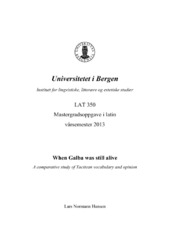| dc.description.abstract | This thesis explores a particular Tacitean phrase, which occurs twice in his corpus. I argue that this phrase is intentionally ambiguous and reflects Tacitus' clever use of heightened rhetoric. "Incolumi adhuc Galba" occurs twice in Tacitus' "Historiae," and is commonly understood and translated to while Galba was still alive." This interpretation is, by all means, correct, but it does not represent the range of meanings in the phrase. It is my claim that Tacitus deliberately uses this exact wording in order to present a personal opinion on Galba, as a person and as a ruler, not solely through the sarcasm I argue is found in the phrase, but also by making Galba the unique recipient of such a description. Acknowledging this as an expression of personal opinion on Tacitus' part provides valuable insight into Tacitus' style, and it might help form a better understanding of how he thought. In order to comprehend the vast potential of "incolumis," I have performed a comparative analysis of its use in Tacitus, Livy, Sallust and Suetonius, based on the examples of said writers in the "incolumis" entry of the Thesaurus Linguae Latinae (the most comprehensive Latin dictionary we have). I am convinced that limiting my analysis to only these four writers may only have exposed some of the potential one might find in "incolumis," but considering that this thesis had to be finished within a year, some limitations were to be expected. Based on this analysis and my studies, I would further state that one sometimes should acknowledge the author's presence, in which he displays personal opinions and observations, in classical prose, and that this is valuable information in forming an understanding of the author specifically, and also in order to comprehend his subject. Improving the knowledge we have on authors and their works increases the knowledge we have of their times and their societies. Before the comparative analysis of the use of "incolumis" in Livy, Sallust, Suetonius and Tacitus, I considered it important to have a general understanding of Roman historiography and methodology, in order to be able to recognise individual characteristics of each writer, and in order to know what generally to expect in Roman historiography. The chapter on the subject is quite brief, and is primarily focused on presenting a short overview on some of Roman historiography's aspects. All the four writers under consideration in the analysis will be given their due introduction, Tacitus a more extensive one in the introductory chapter, whereas Livy, Sallust and Suetonius will be given brief introductions before the analysis. | en_US |
